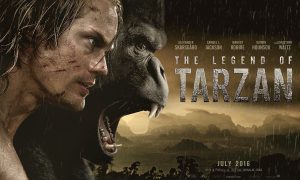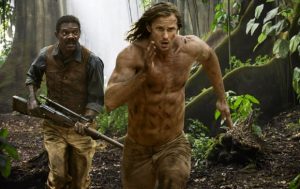
A friend of mine is excited to see “The Legend of Tarzan” solely for the casting of Christoph Waltz as the villain, Leon Rom. He finds him to be one of the finest working actors today, especially when playing the antagonist. I wholeheartedly agree with him and went into my screening of the film with the belief that, even if the film is bad, Waltz will at least be good in it. It is my unfortunate task to report that Waltz isn’t good and neither is the film.
It’s not Waltz’s fault that his performance is uncharacteristically dull. He is the victim of the workmanlike direction by David Yates. This is the same man that brought magic to the “Harry Potter” franchise and looks to do the same with the upcoming spin-off, “Fantastic Beasts and Where to Find Them.” I suspect his interest lied in with that film more, with this project being a necessity for him to complete beforehand. The direction feels more like an obligation than anything else, getting the story from point A to point B in monotonous fashion.

The script, written by Adam Cozad and Craig Brewer, isn’t of much help. It’s a vanilla screenplay serving up a formulaic story. John Clayton (Alexander Skarsgård) has put his Tarzan past behind him, living a comfortable life in a mansion with his wife, Jane (Margot Robbie). He’s called in to return to his old stomping grounds in Boma by the government to prevent Leon Rom from stealing the land’s diamonds and enslaving their people. The man that convinces him to go is George Washington Williams (Samuel L. Jackson), who pries on his emotional connection to the jungle. He tags along to act as comic relief.
Speaking of comedy, the film is littered with awkward humor. Williams acts as a comedic foil to Tarzan, always acting bemused by his antics. There is only one joke in the film that connects and that is when Williams is made to bow before a gorilla. He makes a crass remark about having to possibly fellate the animal, which goes against the film’s tone incredibly, but it made me laugh, so I forgave it. The rest of the humor though is just stunted.

One running gag comes across as rather counterproductive. The entire world knows of the legend of Tarzan, with little kids running up to Clayton with stars in their eyes. They, just like the government and everyone else, treat the legend as a joke. They make disparaging comments in order to gain a laugh, poking fun at Tarzan’s limited vocabulary and grunting. Jane being his damsel in distress is mocked, only for her to actually be just that in the film. Everything that is lampooned about Tarzan comes to fruition and we’re supposed to accept it. If the filmmakers don’t take the material seriously, then why should we?
If there is one thing Yates does well, it’s in pacing the film’s action set pieces. It’s almost like clockwork: fifteen minutes or so devoted to progressing the story, then a few minutes of action, then back to the story, then back to the action. Rinse, wash, repeat. Flashbacks of Tarzan’s life are spliced in throughout as to give a reason for the action as opposed to forcing it onto the story. One such flashback highlights Tarzan’s murder of a young man who killed his adoptive gorilla mother. This acts as setup for Tarzan’s showdown with the boy’s father, Chief Mbonga (Djimon Hounsou), whose sole purpose is to be a formidable foe for Tarzan. Rom is more psychological, meaning the final boss battle will be one-sided (though Leon does have a nifty necklace that acts as a choking hazard). Therefore, Mbonga is thrown into the mix to give the audience an even fight (though it’s not that exciting of one).

The set pieces themselves are decently choreographed, but edited terribly! The overreliance on quick cuts negates the impact of these sequences. Both the takeover of the train and the final showdown with Rom are staged well, but the editing dilutes their impact.
Even so, the action becomes too repetitive for its own good. There’s only so many times you can see Tarzan go toe to toe with a gorilla before you get bored of it (and, in the case of another friend of mine, such an act will send you into a tizzy). Other animals, such as elephants and crocodiles, are thrown into the mix, but they don’t serve much better of a purpose. Though if you were looking for brief tutorials on nature, then this is your film, as Tarzan gives multiple lessons throughout.

All of the elements are there for “The Legend of Tarzan” to be a rollicking good time. It plays out like the old adventure serials that inspired it, but doesn’t capture the magic of those. It’s too dry and banal to incite wonderment. If you’re looking for a fun adventure in the jungle, see “The Jungle Book” instead.
Final Rating: C
